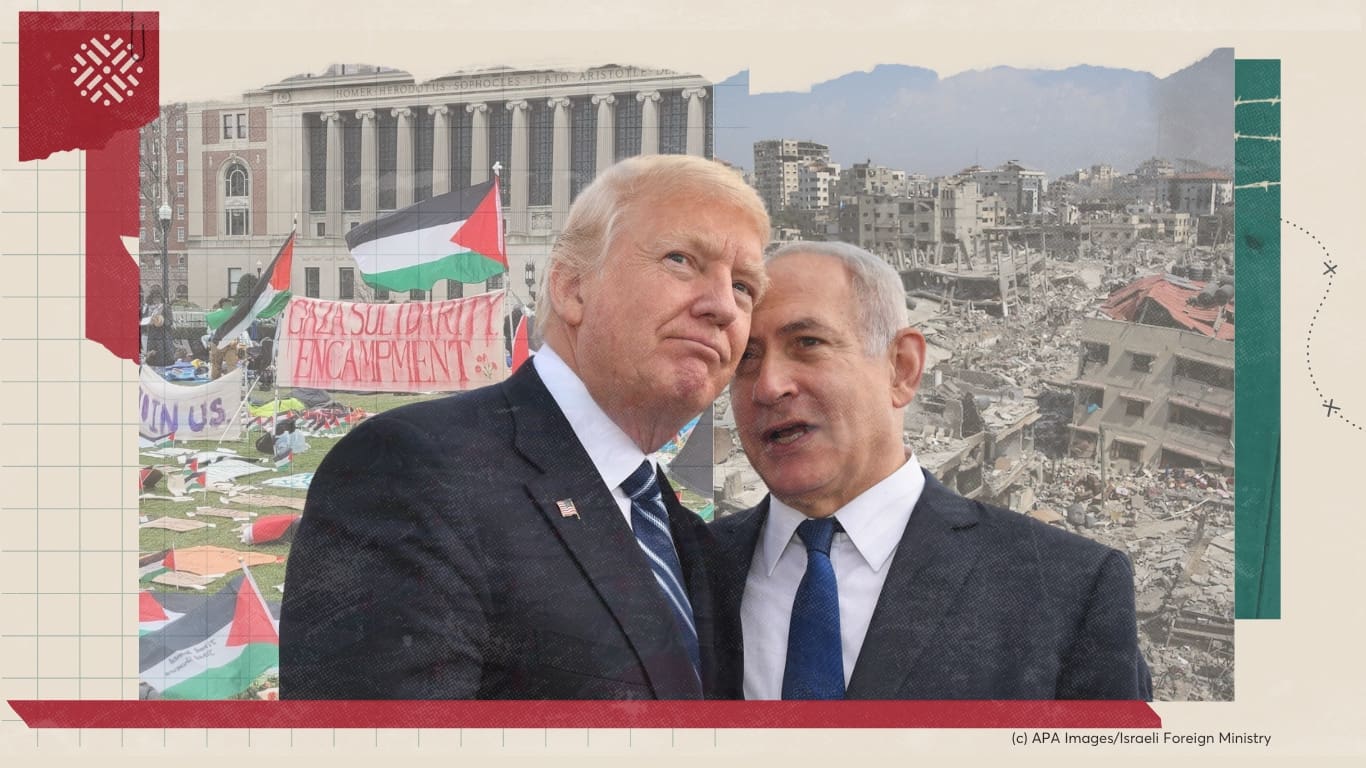
On November 5, 2024, the US electorate voted Donald J. Trump for a second term in the 60th presidential election. His victory and return to office after four years follows a turbulent Democratic presidential campaign, which saw President Biden abandon his re-election bid earlier this year and his successor, Vice President Kamala Harris, double down on US support of the Israeli genocide in Gaza.1
While many aspects of the incoming Trump administration’s foreign policy plans remain uncertain, they will undoubtedly continue to have devastating consequences for the Palestinian people. In this roundtable, Al-Shabaka analysts Tariq Kenney-Shawa, Abdullah Al-Arian, Andrew Kadi, and Hanna Alshaikh offer insights into how Trump will compare to his predecessor, what his presidency will mean for US policy across the Arab region, what lies ahead for Palestine solidarity organizing in the US, and the material impact will be on the ground in Palestine.
How will the Trump administration compare with its predecessor vis-à-vis the US-Israel relationship?
Tariq Kenney-Shawa
In keeping with tradition in US presidential races, Republicans and Democrats have spent the past few months vying for the title of “Israel’s best friend”—a contest defined by candidates trying to outdo one another in both dehumanizing Palestinians and touting their unconditional support for Israel. Both Harris and Trump promised to elevate the already “special” US-Israel relationship to new, unforeseen heights.
While many insisted that Harris represented a “lesser evil” than Trump, her campaign appeared uninterested in validating this argument. Instead of engaging with anti-genocide voters to expand the Democratic coalition needed to win, Harris shunned them. This decision would prove to be just one of a long list of mistakes by Democrats that cost them yet another pivotal election. Trump, conversely, saw an opening and courted Arab and Muslim-American voters, capitalizing on their frustration with the Democratic party and making vague, empty assurances that he would “end the war.”
Now, with Trump poised to return to the Oval Office, we can expect him and his far-right advisors to make good on their campaign promise to intensify Washington’s embrace of Israel. What exactly that will look like on the ground, however, and what impact it will have on the ongoing genocide, is less clear. While Trump has pledged to let Israel “finish the job” in Gaza, he has likewise developed a reputation for being notoriously unpredictable. And if the last year has taught us anything, it is that words alone fail to tell the whole story.
It is crucial to recognize that both the Biden and Trump administrations ultimately share similar visions for the Middle East, with the preservation of Israel's dominance a core priority Share on X
Trump’s uniquely transactional and non-ideological tendencies are what most differentiate him from his predecessor. While Biden’s personal dedication to the myth of Zionism drove his unconditional support of Israel, Trump will act on either his own best interests or the demands of his “America First” base. This approach might make Trump less eager to deploy US assets and personnel to bear the cost of Israel’s defense in forever wars that do not benefit US interests.
Israel’s genocide in Gaza, its invasion of Lebanon, and the constant threat of wider war with Iran have become major obstacles to Trump and Biden’s shared goals of expanding the Abraham Accords and ultimately reducing the US footprint in the region. Indeed, Biden’s unyielding commitment to defend Israel at all costs overshadowed any willingness to pressure Netanyahu into a ceasefire agreement and wider de-escalation. Meanwhile, Trump has repeatedly indicated that he expects Israel to “end the war” so that he can continue pursuing his broader regional objectives, including the major prize of a normalization deal between Israel and Saudi Arabia. What that expectation would look like in practice is a different question.
Importantly, Trump will also have to pander to the interests of his pro-Israel advisors and donors. While the president-elect railed against “war hawks” like the Cheneys during his election campaign, he has already indicated that he will appoint familiar figures like Brian Hook, Elise Stefanik, and Marco Rubio to key positions within his administration. This group will unquestionably advocate for keeping US policy in the region in lockstep with Netanyahu and his far-right governing coalition bent on unapologetically “reshaping” the entire Middle East through brute force.
Still, it is crucial to recognize that both the Biden and Trump administrations ultimately share similar visions for the Middle East, with the preservation of Israel’s dominance as a core priority. Where they diverge is in their tactics: While Biden sought to entrench Israeli domination under a façade of liberalism and multilateralism, Trump has no qualms about abandoning Washington’s traditional diplomatic role and achieving the same goals without attempting to hide the reality of US complicity. Accordingly, we can expect the Trump Administration to take such measures as reversing Biden’s symbolic sanctions on violent Israeli settlers, increasing efforts to shield Israel from accountability at the ICC and ICJ, and empowering Israel’s efforts to destroy UNRWA.
While little will change regarding the fundamentals of the “special” US-Israel relationship characterized by endless Israeli impunity, we will likely see only an intensification of the pro-Israel policies that have spanned both Biden and Trump administrations. What Trump started during his first term—from moving the US embassy to Jerusalem to defunding UNRWA—Biden only further built on during his tenure. Now, Trump will pick up right where Biden left off.
Many Israelis prefer Trump to a Democrat because they believe he is more lenient toward the Israeli expansionist project. However, that support disregards Biden’s Israel-Palestine policy résumé, which was not only nearly identical to his predecessor’s well before October 7, 2023, but has now broken records when it comes to unconditional support for Israel: Biden has provided Israel with more military, political, and diplomatic support than any previous administration amid Israel’s ongoing genocide.
Thus, while Israelis hope Trump will help them “finish the job” faster, it is a process already set in motion and will continue regardless of who sits in the Oval Office. Many overlook the fact that Biden’s relentless efforts to prevent Israel’s isolation and mask US complicity may be the very reason Israel has been able to get away with genocide for so long. The question now is how Americans and the wider international community will react to Trump’s more unapologetic relationship with Israel and overt complicity in the Palestinian genocide.
What does Trump mean for US engagement with Palestinian leadership?
Hanna Alshaikh
It is nearly impossible to discuss an incoming Trump administration without acknowledging the President-elect’s unpredictable nature and approach to policy decisions. With that in mind, it is important to focus on two key aspects of US-Middle East policy under Trump: how the administration may engage, if at all, with Palestinian leadership and the tangible effects this engagement may have on Palestinians.
While Israel and its US supporters aim to replicate the anti-Palestinian agenda of Trump’s first term, it is clear that his second administration will not mirror his first. With a campaign aimed at resolving foreign conflicts to concentrate on an “America First” agenda, coupled with a dramatically altered Middle East regional landscape, it is plausible that Trump’s revolving cast of advisors will prioritize domestic-focused objectives. For instance, Senator Marco Rubio, a leading contender for Secretary of State, recently opposed an emergency aid package for Ukraine, Israel, and Taiwan—not in opposition to Israel, but because it excluded funding for border security, which he called “legislative blackmail.” Trump, also keen to preserve the Abraham Accords and strong Saudi-UAE ties, will likely prioritize de-escalation—an interest growing within the MAGA base. This complex dynamic could lead to a recalibration of US engagement with the Palestinian leadership, potentially abandoning or reshaping current approaches.
Unlike the Democrats, Trump is unconcerned with preserving the ‘rules-based order’ and is more likely to pursue an increasingly narrow and aggressive reading of US interests Share on X
The second Trump administration faces challenges from a cabinet potentially split between isolationists and war hawks. The latter might prioritize Israeli interests over Trump’s domestic agenda, but Trump has historically resisted full-scale war with Iran, parting ways with John Bolton over this issue. Incoming Vice President JD Vance, also against war with Iran, signals continuity in this opposition to such an approach. This stance contrasts sharply with Netanyahu’s expectations of unconditional US support, further complicated by Trump’s unpredictable foreign policy maneuvers.
More pronounced in his next term, Trump’s outsider branding suggests continued dismissal of traditional US protocol. Pressure from his base culminated in Trump’s choice to exclude neoconservatives like Nikki Haley or Mike Pompeo from key roles, increasing the likelihood that the incoming administration will only escalate this defiance. For example, in 2020, Ismail Haniyeh revealed that Jared Kushner’s office had sought a meeting with Hamas via an intermediary. Hamas declined, not “as a matter of principle,” but because it was apparent to leaders that the intention was to coerce the movement to disarm and accept the Deal of the Century. While such outreach seems improbable post-October 7, Trump’s record of defying expectations remains notable—for instance, he became the first sitting US president to enter North Korean territory after the Korean War during a meeting with Kim Jong Un at the Demilitarized Zone in 2019.
The Palestine Liberation Organization (PLO) severed ties with Trump over the US Embassy move to Jerusalem in 2017, and the Palestinian Authority (PA) publicly claimed to end security coordination with the US and Israel in protest of the Deal of the Century. Communication channels have reopened in the aftermath of the US elections, with Trump and Abbas speaking over the phone regarding a ceasefire in Gaza. Days earlier, Hamas and Fatah met in Cairo to discuss post-war arrangements, agreeing upon a “Gaza administrative committee” that will be factionally independent and comprised of technocrats and civil servants tasked with post-war relief. Despite the fragmentation of the Palestinian body politic, this agreement, coupled with Trump’s favorable view of Abbas, might influence US mediation efforts.
Perhaps Trump’s interest in resuming talks with Abbas was motivated by his positive view of the Palestinian president and his admission that, in contrast, “I don’t think Bibi ever wanted to make peace.” While Trump publicly reconciled with Netanyahu after a rift caused by the Israeli Prime Minister’s congratulatory message to Biden in 2020, he values loyalty to himself above all else, and there is a palpable sense of anxiety among some pro-Israel commentators and Israeli publications. None of this was on the table in 2016.
If Trump honors his campaign promises to end wars, Palestinians face two scenarios: First, a drive for regional stability could see Washington-brokered arrangements favoring Israel while reducing bloodshed in Gaza and Lebanon. Political progress might stall, but severe blows like defunding UNRWA might be avoided, allowing for Gaza reconstruction. This scenario may entail an expansion of the Abraham Accords, such as Saudi normalization—a feat the Biden administration could not achieve through its “bear hug” approach to Israel—in exchange for Israeli de-escalation. Second, Trump could alternatively abandon peace efforts altogether, giving Israel carte blanche for annexation, ethnic cleansing, and undermining Palestinian institutions like UNRWA. This would have devastating consequences for Palestinians.
In any case, Palestinians must brace themselves for a volatile and unpredictable term. After one year of the Biden administration’s active participation in the Gaza genocide, which has brought down the international order imposed by the US for almost a century, US norms for engaging with the world may be upended in new ways—and engaging with Palestinian leadership will be no exception.
What does the incoming Trump administration mean for US policy across the Arab region?
Abdullah Al-Arian
Trump’s recent election raises immediate questions concerning how his administration will approach foreign policy compared to his predecessor. The short answer is: quite similarly. The underlying strategic outlook of US policy in the Middle East is primarily determined at the structural level, which often shapes policy options, resulting in minimal concrete differences between administrations. Nevertheless, Trump has exhibited a determination to test the bounds of established policy practice, which, in as fraught and destructive a moment as this, could have devastating consequences in the future.
Liberal critics frequently stress that the first Trump era signaled a major break with traditional US foreign policy. While it is true that Trump dispensed with conventional diplomatic protocol and occasionally embarked on personal projects in the realm of global affairs, his initiatives in the Middle East did not represent a radical departure but rather an evolutionary step for conventional US policy. Rather than working to reverse Trump’s regional feats—such as the nullification of the Obama-era Iran deal or the relocation of the US embassy to Jerusalem—Biden’s top priority in the region was little more than building upon Trump’s proudest achievement, extending Israel’s normalization with several Arab regimes to Saudi Arabia—a project that was at least temporarily upended on October 7.
While Israel and its US supporters aim to replicate the anti-Palestinian agenda of Trump's first term, it is clear that his second administration will not mirror his first Share on X
In the decade that preceded the events of October 7, US policy in the region can be briefly summarized as follows: containing Iran while gradually weakening its regional allies; maintaining Israel’s military superiority while also strengthening and realigning Arab client regimes under a common security framework undergirded by diplomatic normalization and economic integration; and further isolating the Palestinians while permanently removing the question of their political future from the global agenda.
As Israel launched its genocidal war in Gaza last autumn, it quickly became clear to US policymakers that this arrangement was no longer tenable. As a result, the Biden administration pursued a new course that largely followed the lead of the current Israeli government, which turned the post-October 7 moment of crisis into an opportunity to aggressively reshape the regional landscape by decimating the military capabilities of regional resistance movements, if not destroying them as organizations altogether.
From the onset of Israel’s war, however, it became readily apparent that its expanding regional onslaught would eventually entail a direct confrontation with Iran, leading to a rare point of divergence between Israeli and US officials. While the US supported multiple Israeli actions intended to weaken Iran—a significant escalation from its prior position of containment—the Biden administration nonetheless sought to avoid an all-out war that would entangle its own military forces.
The Israeli leadership may see in Trump an opportunity to bypass the foreign policy establishment and pull the US into that conflict more directly. Whether Trump would accede to those attempts is unclear: he has repeatedly signaled that he has no interest in long-term military entanglements given their negative impact on the economy and Trump’s personal prestige—two factors that take priority. There are, however, members of Trump’s inner circle who are wholly in line with the Israeli far-right aims of widening the conflict with Iran, so it remains a possibility.
The developments of the last year have also threatened to upend the so-called “rules-based order” upon which the US and its allies have forged the system governing international relations since World War II. That order, built upon a number of international institutions and practices, as well as the body of international law and human rights norms, has provided the US with the credibility, leverage, and capacity to make moral claims to intervene as it sees fit, not only in the Middle East but in regions around the world, with the Ukraine war serving as only the most recent manifestation.
Unlike the Democrats, however, Trump is unconcerned with preserving the “rules-based order” and is more likely to pursue an increasingly narrow and aggressive reading of US interests that could further destabilize that order or collapse it altogether. While the Biden administration did little to temper Israel’s war on the UN and, in fact, enabled it through its own punitive actions against UNRWA, Trump is less likely to be troubled by the fallout of this particular conflict for the future of the UN as a whole and would likely back the dismantlement of UNRWA.
What is clear is that Trump’s vision for a Palestinian future would consign them to live as a captive population within a revitalized Israeli security regime underwritten by authoritarian Gulf states. Irrespective of the outcome, the US election was sure to spell more doom for the region and its people. Trump’s latest rise simply brings with it a clarity of purpose unburdened by the thin veneer of liberalism.
What lies ahead for Palestine solidarity organizing in the US?
Andrew Kadi
Several sources can help us understand what a second Trump presidency means for US activism in support of Palestinian liberation. Trump’s first administration, his 2024 campaign promises, and the recent works of Trump-affiliated think tanks collectively foreshadow an oppressive environment for popular organizing.
During his first presidency, Trump aggressively signaled support for Israeli expansionism and military occupation while simultaneously working to silence dissenting voices in the US—primarily through the conflation of criticism of Israel with antisemitism. In 2017, Trump nominated Kenneth Marcus as Assistant Secretary for Civil Rights at the Department of Education (DOE). Marcus, founder of the Brandeis Center for Human Rights, had long advocated for the conflation of anti-Zionism with antisemitism in a deliberate effort to crack down on criticism of the Israeli government and Palestinian solidarity activism.
The incoming Trump administration has a clear strategy…that centers the weaponization of Islamophobia and accusations of antisemitism in service of the repression of Palestinian solidarity activism Share on X
During his time at the DOE, Marcus continued this campaign and successfully pushed for a 2019 sweeping executive order that incorporated antisemitic discrimination into Title VI of the Civil Rights Act. Importantly, Trump’s order adopts the IHRA definition of antisemitism, which largely centers on the State of Israel and identifies any claims of the Zionist project as a racist endeavor to be antisemitic. Since 2021, Marcus has served as chairman of the Brandeis Center, where he has used the revised Title VI to file at least a dozen complaints of antisemitism against educational institutions, often over criticisms of Israel. These complaints have had a chilling effect on free speech in educational spaces.
Marcus’s return to the DOE, or a future federal agency overseeing education, is plausible, particularly in light of recent efforts by Trump-aligned Republicans in the Committee on Education and the Workforce to target Palestine solidarity activism on university campuses. Indeed, hearings by the committee and the Senate on campus antisemitism over the past year showcased blatant anti-Palestinian and Islamophobic sentiments and revealed an ideological opposition to free speech in the Legislative branch. Combining this opposition with similar efforts from the Executive under the incoming Trump administration is sure to create a McCarthyite atmosphere for Palestine-related education and activism on university campuses and within other educational spaces.
The previous Trump administration also went after the Boycott, Divestment, and Sanctions (BDS) Movement. Indeed, the aforementioned executive order aimed to brand boycott and divestment initiatives on campuses as antisemitic. In 2020, Secretary of State Mike Pompeo further emphasized the administration’s efforts to combat the BDS movement, which he described as a “cancer” and a “manifestation of antisemitism.” In a joint press conference with Netanyahu, Pompeo stated that anti-Zionism is antisemitism and that the administration would cut any funding to organizations participating in or endorsing BDS campaigns.
Beyond education spaces, the crux of Trump’s plan to target the Palestine solidarity movement and its auxiliaries in a second term resembles post-9/11 war on terror tactics fueled by rampant anti-Arab and Islamophobic discrimination. Today, both the Trump team and affiliated think tanks, such as the America First Policy Institute (AFPI) and the Heritage Foundation, propose using falsified links between Palestinian rights organizations and terrorism-designated entities in the US to impede Palestinian solidarity organizing. Project Esther, released by the Heritage Foundation in October 2024 and a product of the National Task Force to Combat Antisemitism, is one of several such plans that outline specific strategies to disrupt the movement from within; methods outlined in Project Esther include deporting international students, using the Racketeer Influenced and Corrupt Organizations (RICO) Act to crack down on organizations, and infiltrating the movement to sow distrust between organizers.
Trump himself reportedly told donors he would work to set the movement for Palestinian rights back by 25 to 30 years. Notably, Trump has tapped Linda McMahon, chair of AFPI, to co-lead his second-term transition team. AFPI’s board and staff include at least four previous Trump administration officials, including Kellyanne Conway and top domestic policy directors Brooke Rollins and Chad Wolf. Trump is also reportedly eyeing AFPI’s Lee Zeldin to head the Environmental Protection Agency (EPA).
Trump has also made calls to militarize the streets and suppress protests. Throughout his 2024 campaign, Trump suggested he would deploy the military if elected and regularly spoke of the “enemy from within.” This approach mirrors that of his first administration, when he deployed the National Guard across 23 states and the District of Columbia during the 2020 uprising for Black lives, along with federal law enforcement agencies not typically present at protests.
Trump’s calls to militarize the streets exist in parallel to his empowerment of MAGA thuggery, where he incites violent groups like the Proud Boys to intimidate and terrorize activists. Such was the case with the Kyle Rittenhouse shooting in Kenosha, Wisconsin, and the presence of the Michigan Liberty Militia at the Michigan Statehouse during public health advocacy efforts.
The incoming Trump administration’s strategy to suppress the Palestine solidarity movement is clear: Weaponize Islamophobia and accusations of antisemitism to silence criticism of US support for the Israeli state and create a chilling impact on potential future activism. Republicans in power will bolster this strategy through expansive efforts to limit civil liberties, dismantle education infrastructure, and outlaw criticism of the Zionist project.
- To read this piece in French, please click here. Al-Shabaka is grateful for the efforts by human rights advocates to translate its pieces, but is not responsible for any change in meaning.
Abdullah Al-Arian is an assistant professor of history at Georgetown University in Qatar, where he specializes in the modern Middle East and the study of Islamic social movements. He is the author of Answering the Call: Popular Islamic Activism in Sadat’s Egypt (Oxford University Press, 2014). He is also co-editor of the Critical Currents in Islam page on the Jadaliyya e-zine. Twitter: @anhistorian
Tariq Kenney-Shawa is Al-Shabaka’s US Policy Fellow and co-host of Al-Shabaka’s Policy Lab series. He holds a Masters degree in International Affairs from Columbia University. Tariq’s research and writing have covered a range of topics, from the role of open-source intelligence in exposing Israel’s war crimes to analysis of Palestinian liberation tactics. His writing has appeared in The Los Angeles Times, Foreign Policy, and The Nation, among others. Follow Tariq on Twitter @tksshawa and visit his website at https://www.tkshawa.com/ for more of his writing and photography.
Hanna Alshaikh is a PhD candidate in History and Middle Eastern Studies at Harvard University and is the Palestine Project Coordinator at Arab Center Washington DC. She holds a master’s degree from the University of Chicago’s Center for Middle Eastern Studies. Previously, Hanna was an adjunct professor at DePaul University’s Religious Studies Department, where she taught courses on religion and politics in the Middle East. Her writings have appeared in outlets including The Hill, Vox, Mondoweiss, The Nation, and Middle East Eye.
Andrew Kadi is a human rights activist and occasional contributor to the Guardian’s Comment is Free, The Electronic Intifada, MondoWeiss, Left Turn, and other publications.




















